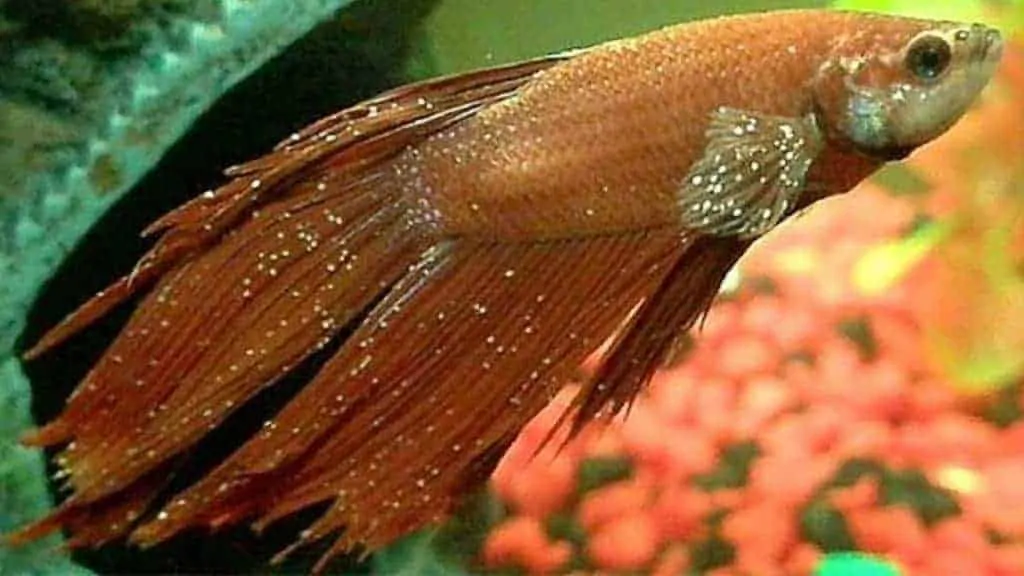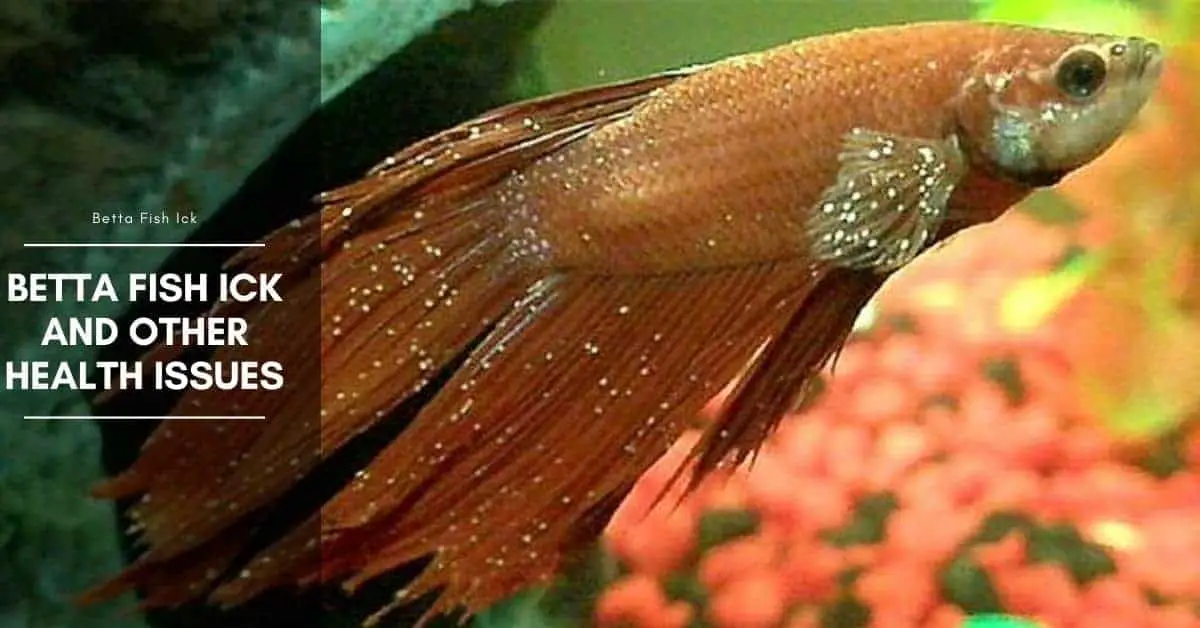Ick is a parasite found in many fish tanks. Unfortunately, there are a large number of health issues that can affect your betta fish during his lifetime. Let’s take a look at a few of these things, and learn what we can do to keep our betta’s comfortable and healthy.
What causes ick in my betta fish?
Betta Fish ick disease is both common, and difficult to treat.
Causes include poor water quality and water temperatures that are too cold. Both weaken your betta’s immunity and make him susceptible to diseases he wouldn’t ordinarily catch.
Symptoms
The symptoms of this are white specks all over your betta’s body. Your betta might not be hungry (an alarming symptom in betta) and he may try to scratch himself on ornaments.
To get rid of this pesky parasite, you will need an ick cure such as “rid-ich” which is basically a deep blue dye that will starve the parasite of light, something it needs to survive.
You’ll also want to bump up the temperature to between 85 and 88 degrees to help kill off the parasite.
Treatment
Treat according to instructions on the ick medication.

Fin Rot
You go to feed your betta one day and notice his fins are looking sort of ragged. At first its just a tiny little difference, a little hole in the fin or a tiny little bite out of the tip of his tail, but it keeps getting worse.
The edges of the fin may turn black, and if left untreated, the fin gradually appears to be eaten away, until it reaches the body and death is inevitable.
API STRESS COAT Aquarium Water Conditioner 16-Ounce Bottle
Tetra AquaSafe Plus, 8.45 Ounces, aquarium Water Conditioner And Dechlorinator, Model Number: 46798162681
$10.19 (as of February 11, 2026 06:50 GMT +03:00 - More infoProduct prices and availability are accurate as of the date/time indicated and are subject to change. Any price and availability information displayed on [relevant Amazon Site(s), as applicable] at the time of purchase will apply to the purchase of this product.)API TAP WATER CONDITIONER Aquarium Water Conditioner 16-Ounce Bottle
$8.48 (as of February 11, 2026 06:50 GMT +03:00 - More infoProduct prices and availability are accurate as of the date/time indicated and are subject to change. Any price and availability information displayed on [relevant Amazon Site(s), as applicable] at the time of purchase will apply to the purchase of this product.)Symptoms
“Fin Rot” is not actually a disease in itself, but a symptom that can be caused by many different things. A sharp decoration can tear a hole in the fin, which may lead to infection. More commonly, fin-rot is caused by dirty water and the things that cause dirty water. (Not enough water changes, feeding too much food, and overcrowding the tank.)
If you suspect your fish of fin rot, your best bet is to check water quality first. (Is the ammonia at 0? Nitrites 0? Nitrates very low? Are you mid-cycle? Your betta may not be able to cope with finishing the cycle if he’s ill.)
Water Quality
If water quality is perfect, run a clean, unused pair of pantyhose all over everything in the tank and check for anything that may have caused a tear in the fins. If something tears the pantyhose, remove it from the tank. Watch your betta. Do you have an over-the-back filter? Is he getting sucked against the intake? He makes be losing his fins from them getting ripped off by the filter. No, he’s not “Resting” against it, he just hasn’t mustered the strength to escape it yet.
Baffle the filter, either by covering the intake with pantyhose, stacking tall plants such as wisteria and amazon around it, or getting rid of it and putting in a sponge filter. Does he have tank mates? Is one of the tank mates nipping at him? Is he nipping himself? Some bettas tear their own fins out of sheer aggression/boredom. Covering the tank so he can’t see his own reflection will sometimes help.
Bacterial Infection
If it is an actual bacterial infection, you will be able to tell because the area will be rimmed in black, or possibly red if the damaged area is bloody, and he may have lesions on his body as well. Your best bet here is to keep the water immaculately clean and watch the betta carefully if the damage isn’t too severe.
If the fin keeps getting shorter and shorter, treat with Maracyn 2. Treating with medication will help the fish, but remember that finding out why he got fin rot is as important as treating the case.
Without knowing why, your betta will get better because you treated it, and then worse because you didn’t resolve the root problem. Remember, there are very few fishy diseases in the world that can’t be cured with a water change and maybe a little aquarium salt.

Popeye
One or both of your betta’s eyes are HUGE. It looks like he has the fishy version of a black eye, or if it is both eyes he looks like a hammerhead shark. This is most often caused once again by dirty water. (Just a friendly reminder: Huge tank + one fish = fewer water changes.)
Symptoms
Popeye is once again not so much disease in itself, but a symptom of several possible diseases. In most cases, it is a simple bacterial infection, and clean water alone will cure it.
You can use a broad-spectrum antibiotic to help, but if you don’t know what is causing it, it may not help. The biggest concern of Popeye isn’t the disease itself (again, clean water is your betta’s biggest need in helping to heal.) it is the possibility that it may be fish tuberculosis.
Fish tuberculosis
Fish tuberculosis is scary because it is one of the few fish diseases that you can catch from your fish. If it is Fish TB your fish will die, and there is nothing you can do about it. If you suspect fish TB, do not put your hands in the water without gloves, and wash with a good anti-bacterial soap.
Other signs of Fish TB include skeletal deformities, loss of color and scales, and wasting away. If your betta starts developing a crooked spine, your best bet will be to euthanize him, as the disease is fatal and all you will do for him by keeping him alive is making him suffer. Back to Popeye, you do not need to euthanize your fish at the first sign of a bulgy eye! In most cases, it is a simple bacterial infection caused by dirty water.
Make an alarm in your cell phone that yells at you to change the water once a week, and do a water change every other day until his symptoms subside. If you are very worried, or his eye is incredibly huge, treat with Maracyn 1 and Maracyn 2 together (to cover both gram-positive and gram-negative bacteria.)
Cotton Mouth
If you see any sort of cottony fuzz anywhere on your betta’s body, it probably has a fungus. Do a water change and add a little aquarium salt to the water (use-package instructions) and keep an eye on it. You may need an anti-fungal medication if his condition worsens.
Dropsy
Once this disease starts showing symptoms, there isn’t a lot of hope for your fish. Symptoms of dropsy include raised scales (“Pine-coning”) and severe bloating. If your betta is with other fish, isolate him immediately. You can try to save him with antibiotics and aquarium salt, but in most cases dropsy is fatal.
External Parasites
If you notice a lot of itching, scratching, and possibly gasping for breath, your betta may have external parasites or gill-flukes. Treat with a medication such as “parasite clear”.
In Conclusion
General Symptoms Of Illness
Even if you see none of the above specific symptoms, you may notice other signs of disease before a big symptom develops. If your betta is clamping his fins, not interested in food, pale or listless, do a water change, add a little salt, and check that the temperature is a reasonable level. (Even if you have a heater, it may have broken. You just never know.) By keeping a close eye on your betta, you can avoid a major illness by nipping small things in the bud.
Why Betta Fish Get Sick In The First Place?
If there is anything I would like you to come away with after reading this, it is that clean water, a little aquarium salt, and sufficient heat to keep the betta warm is all you need to keep betta healthy.
Parasites and fungal infections can be prevented by adding aquarium salt along with your water changes, and most bettas won’t get any disease providing the water is clean and clear.
As long as you own betta, or any fish for that matter, strive for the best possible water conditions. That tank is your betta’s life support system. He can’t go anywhere, he can’t step out for a breath of fresh air, he can’t clean his own toilet.

Hi, my name is Sean, and I’m the primary writer on the site. I’m blogging mostly about freshwater and saltwater aquariums, fish, invertebrates, and plants. I’m experienced in the fishkeeping hobby for many years. Over the years I have kept many tanks, and have recently begun getting more serious in wanting to become a professional aquarist. All my knowledge comes from experience and reading forums and a lot of informative sites. In pursuit of becoming a professional, I also want to inspire as many people as I can to pick up this hobby and keep the public interest growing.
Read more about Sean.
Please join also my Facebook group.




















